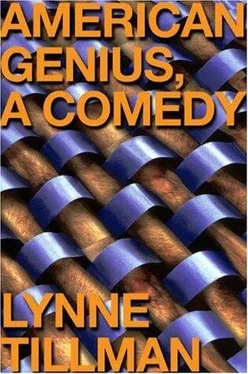The room is full, its thirty chairs with our bodies on them absorb oxygen and noise, and also we make sounds, I hear inharmonious wheezing, coughing, and some shortness of breath. Contesa leaves the podium, the lights dim, and, to my shock, from the wings, the odd inquisitive woman wanders onstage, looking about in all directions as if lost, replacing Contesa behind the podium. The odd inquisitive woman holds herself erect in her tatty skirt, a black pullover sweater, while her unruly hair is tucked under a brown suede beret. She would see me soon enough, she said to me in town, I remember that now. She stares at the audience and projects a strength and purpose that is impressive; there is something almost magnificent about her bearing. I cast my eyes quickly over the cover sheet of the typescript: Four Players-The Narrator, Franz Kafka, Felice Bauer, Max Brod-written by Violet.
The Narrator: This is a work in collaboration with the letters of Franz Kafka and the spirit of Felice Bauer. Her letters are lost. So I will take liberties. The Saints preserve pariahs like me. Please touch the hand of the persons beside you, please touch their hands.
The Count and Spike are beside me, and there is an awkward touch from the Count, who once embraced me, but nothing more, and I hold his hand for a second, and, from Spike a rhythmic pat or two, she is usually affectionate, and behind me I sniff the sodden odor of the demanding man, but can't know if he's touching anyone or being touched.
The Narrator: Kafka wrote to Felice, "He who belongs to you keeps wandering about in the distance." In the present, Kafka's and Felice's souls, they will mingle. Here comes Kafka.
The inquisitive woman, the narrator, points stage right, and, augmenting my surprise, the tall balding man walks on, his shoulders a pair of parentheses around his body, which is stiff as an exclamation mark, and I wonder what J and JJ will think of his truculent carriage. He's wearing a black suit and black derby, like an undertaker. He removes the hat and takes a chair, he is himself and not himself, and I recall that he played Kafka in my dream some time ago, and, now his secret lover, the disconsolate woman, enters, stage left, and I feel my stomach contract, while the demanding man groans, Spike chortles with muted pleasure, and the Count sinks into his chair. The tall balding man, or Kafka, waves to her, his Felice, feebly. She nods, and the disconsolate woman, or Felice, faces the audience. She's staring above our heads, toward the rear of the Rotunda Room.
Kafka: "There are times when impossibility swamps possbility like a wave."
Felice: He whips himself for us.
Kafka: Never. I'm no Christ, but I am a Jew.
Kafka looks aghast, then sad, then he breaks up at his own preposterousness, and I contain my laughter, but some suffocated or constricted noises come out. The tall balding man is so expressive onstage, he exaggeratedly throws back his arms, demonstrative in a way he never is, so watching him act, I'm nervous. His flesh confronts me, he even appears to have an aura or charisma, and, spotlighted, he becomes an object whose every deficiency is on exhibition, people exhibiting themselves can produce some embarrassment. I anticipate that, even shame, but not guilt, thankfully. The other bodies around me stretch their legs, their asses shift on the tufted dark-green velvet cushions, their mouths smack, and noses snort, a being-human chorus.
Kafka: "But how could my writing to you, however firm my hand, achieve everything I want to achieve: To convince you that my two requests are equally serious: `Go on loving me' and `Hate me!" Felice: My heart, I have no answer.
Felice seems to speak from her heart, since she has no technique for walking, standing, or acting, and whatever merit there is in her acting comes from her inability to conceal herself, so she is herself, or an exaggeration of herself, and I'm following, with distractions, people I've had breakfast, dinner, and drinks with, if they are allowed to drink, as they transform into characters like or unlike themselves. I can spy unguardedly. The disconsolate woman, Felice, sits down and pretends to write, but then she looks again at the audience, now directing herself to the Count, I think, it's hard to say, it could be to the demanding man, whose odor penetrates. The inquisitive woman shuffles to the lectern, once again as if she's lost, it's deliberate then, and she's wearing purple lipstick, I'd missed that before.
The Narrator: Kafka wrote that in 1913. He started it all, Franz began writing Felice in 1912. They were engaged twice and Kafka broke it off permanently in 1917. By then Kafka coughed blood. But from the beginning, he created her. Kafka enchanted her, and she was his enchantment.
Kafka strides to the side of the stage and looks longingly at Felice.
Kafka: "I'm afraid that soon I shall no longer be able to write you, for to be able to write to someone (I must give you all sorts of names, so for once you must be called 'someone') one has to have an idea of the face one is addressing…"
Felice plucks a hand mirror from behind or under her chair and looks at herself, the disconsolate woman's psoriasis has flared, reddened slightly, she's not my image of Felice, though it's sly of Contesa to have cast her, but she must have wanted the role. I appreciate Contesa's discretion, how she kept this a secret, I appreciate this and also some forms of deviousness, but the disclosure of secrets can alarm and be destructive, especially if they expose a long-kept masquerade with intricate roots, whose undoing rips foundations, because change has unknowable effects. I know several people whose fathers had second families they kept hidden, who performed as double husbands and fathers, in elaborate hoaxes, for years and years, making the task seem easier to perform than it is, or it is people's necessary gullibility, their desire not to see what might hurt them, that permits such inestimable deception. I have a friend a part of whose life may be secret, but by now I don't want him to reveal it, because there are things I don't want to know and whose exposure might destroy our relationship. He may or may not have a married lover, whose husband is ill, I've often considered he does, and that when he departs on a journey, for he often travels, he's not going anywhere but to his furtive mistress, and for some reason he wants even his closest friends to think he has, as he says, no one to love, and this possibility fascinates me, so I'd be disappointed if it weren't the case, but also I don't want to know absolutely it is, because then it would change our relationship.
The Narrator: Max Brod, Kafka's best friend, interpreted Kafka for Felice. First Felice wrote to him. Brod wrote back to her. Later, he disobeyed Kafka's will. He didn't destroy Kafka's unpublished work, his letters or diaries. Kafka trusted Brod, but he also had invoked chance. Or, did he know what Brod would do?
Arthur saunters onstage, the fourth player, he is Max Brod, a jaunty figure, and his partner, Henry, sits in the first row beaming, looking around, human beings want approval, even their approval approved. Arthur's thick, long hair is tied in a chunky ponytail, and he too is in a black suit, but no hat, and sports a cravat and monocle, and, because of the style, I sense another time, as style marks periods, even years, with its date stamp, or maybe it's because I know too little yet about Arthur, since he communicates mostly to his partner, and this allows me to enter the period better, though Max Brod was Jewish, like Kafka, and Caucasian, but there are also black or African Jews.
Kafka: "I have always looked upon my parents as persecutors."
Brod (to Felice): Franz was furious when his mother read your letter to him. But "Franz, thank God, is gratifyingly stubborn and sticks precisely to what is good for him. His parents just will not see that an exceptional man like Franz needs exceptional conditions to prevent his sensitive spirit from withering. "
Читать дальше












